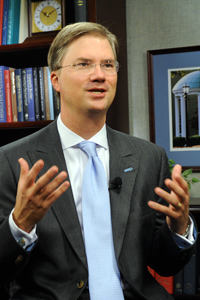Carolina's Research Mission
Thorp on Why Graduate Students Matter

Holden Thorp, Chancellor
When top-ranked basketball recruit Harrison Barnes announced that he would attend the University of North Carolina at Chapel Hill in 2010, he made it clear that his decision was about more than the hope of victory on the basketball court. Barnes had his choice of many of the best universities in the nation, including UCLA, Stanford, and Duke. He chose UNC-Chapel Hill. He knew he would get a fulfilling learning experience in the best environment possible.
Few realize that the choice to attend Carolina, made by thousands of undergraduate students like Barnes, is intimately connected to graduate education. The highest recruits—who bring their talents to the classroom, the lab, and sometimes even the basketball court—consistently place major research universities at the top of their lists, which Chancellor Holden Thorp views as a very good thing.
“Undergraduates come to a university where new ideas are being tested and where innovation is part of the culture, and that is what has driven the excellence of American higher education,” says Thorp, a strong advocate for graduate education.
Thorp says that quality graduate education sets the tone for the entire University. “Most people think about the University in terms of their undergraduate experience, but they don’t think about what is in the engine of the car that makes that experience what it was.”
That engine is research. Carolina’s importance to the state, the nation, and the world cannot be separated from graduate education because graduate students fuel research. UNC-Chapel Hill has a legacy of deeply impacting people’s lives because Carolina succeeds in its role as a research university.
“That is the main part of our identity,” Thorp says. “If we don’t succeed as a research university, then we’re not succeeding at what Carolina is all about.” Maintaining Carolina’s standards demands excellence at every level, but because of the critical importance of research, “making sure that we have the highest quality graduate programs is at the absolute top of the list.”
“The people who have supported the Graduate School and the graduate students and the departments are some of the most prized friends that Carolina can possibly have.”
Thorp understands the direct impact graduate students can have on undergraduates: he experienced it himself. Thorp discovered his career path during his senior year at Carolina. Graduate students in Professor Thomas Meyer’s chemistry lab helped teach Thorp to conduct research for the first time, and research has been central to Thorp’s professional world ever since.
Quality research saves lives, creates jobs, enriches people’s experiences, awakens new possibilities, and deepens our understanding of the world. UNC-Chapel Hill research impacts both the people of North Carolina and the world at large. The preeminence of American higher education is built on research.
“If you ask yourself what it is about the United States that has made it the primary hub of innovation in the world, you have to conclude that it is the research universities,” explains Thorp.
Excellence in graduate education means rigorous study. It means an absolute commitment to the highest standards of work ethic and performance. It means finding new ways to ask the toughest research questions. And it means providing opportunities for brilliant minds to delve into the unknown. But at Carolina, research excellence also means impact.
“This is a place where it’s basically impossible to keep people from serving the community,” Thorp says. “We are evolving into a place where the research that we do and the impact that it can have on the community are becoming indistinguishable. And I think that’s good. We continue to produce high-quality scholarship that also enhances the community, and I guess you’d really say the world.”
The University must constantly reinvent itself and improve to maintain its position of leadership and impact. Continued support for graduate education is at the heart of Carolina’s success.
As Thorp says, “The people who have supported the Graduate School and the graduate students and the departments are some of the most prized friends that Carolina can possibly have.”
For Carolina to remain a leading public research university, support for graduate students is essential. Quality graduate education attracts the best talent at every level—faculty, graduate students, and undergraduates.
♦ Jeremy Cramer


